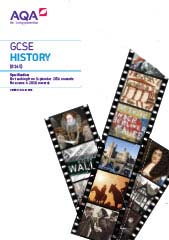Subject content
The subject content for GCSE History states that the scope of study should include history:
- from three eras:
- Medieval (500–1500)
- Early Modern (1450–1750)
- Modern (1700–present day)
- on three timescales:
- short (depth study)
- medium (period study)
- long (thematic study)
- on three geographical contexts:
- a locality (the historic environment)
- British
- European and/or wider world settings.
British history must form a minimum of 40% of the assessed content over the full course.
Students are required to study:
One thematic study
This enables students to understand change and continuity across a long sweep of history. The study must cover all three specified eras.
One period study
This allows students to focus on a substantial and coherent medium time span of at least 50 years. The study will require students to understand an unfolding narrative of substantial developments and issues. The period study can be from any of the specified eras.
Two depth studies
One British and one European/wider world. Depth studies enable students to focus on a substantial and coherent short time span. The studies enable students to gain understanding of the complexities of a society or historical situation and the interplay of different aspects within it. Depth studies must be taken from different eras.
A study of the historic environment
The study of the historic environment should focus on a particular site in its historical context and enable students to study the relationship between a place and historical events and developments. There is no requirement to visit the site. This study can be linked to any other part of the course or may stand alone.
The subject content for GCSE History requires that students follow a ‘coherent and substantial study of history in which the elements are reasonably balanced’.
